
AVF-C Range
Superior Efficiency Canned Motor Mag Drive Pump
The AVF-C plastic canned motor mag drive pump is built to save you energy - with the highest motor efficiency (IE5 & GB1 equivalent), highest pump efficiency (Minimum Efficiency Index, MEI >0.7), and variable frequency drive meaning the smallest carbon emissions chemical pump you will ever own.
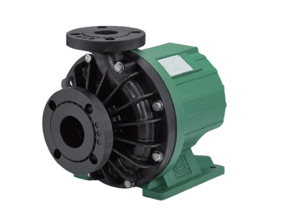
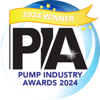
The AVF-C is built to save you energy - with the highest motor efficiency (IE5 & GB1 equivalent), highest pump efficiency (Minimum Efficiency Index, MEI >0.7), and variable frequency drive -meaning the smallest carbon emissions chemical pump you can buy.
Canned motor pumps integrate the design of the electric motor and magnetic drive pumps into one. The stator of the motor directly drives the inner magnet of the pump, eliminating the motor rotor and the drive magnet. Like the mag drive pump, the magnetic flux between the stator and the inner magnet passes through the containment shell (can), allowing the pump to be hermetically sealed for leak-free operation.
Because the AVF-C range uses a permanent magnet rotor and there is no induced current compared to an induction motor, efficiency is increased by up to 20% and power consumption reduced by 50% or more.
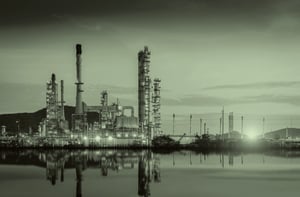
THE CREST PUMPS LIFETIME GUARANTEE
No matter how old your pump becomes, in the unlikely scenario that you have a problem, our engineers will be on hand to diagnose the issue and help you get up and running again.That’s why, with Crest Pumps you’ll never need to worry about unplanned downtime again.
Talk to us now to discuss your chemical pump requirements or book a free site audit to see how much time and money you could save!
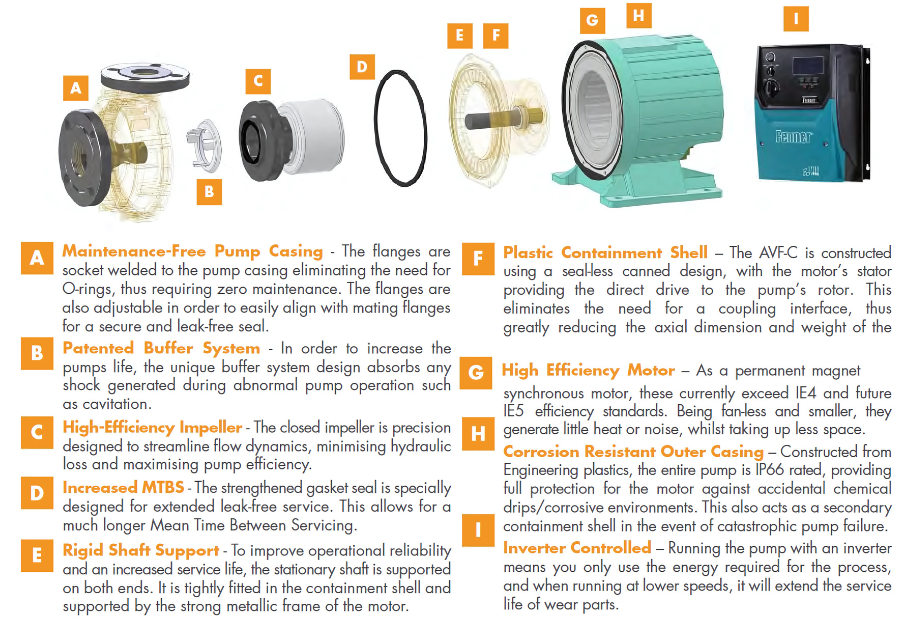
Everything's Reduced
Because the AVF-C range is a fan less design, both heat and noise are significantly reduced compared to traditional mag drive pumps. And because of the canned motor principle, they are smaller and lighter weight, taking up less floor space and easier to manoeuvre for maintenance.
Discover the significant savings you can achieve and explore the potential financial benefits that await you.
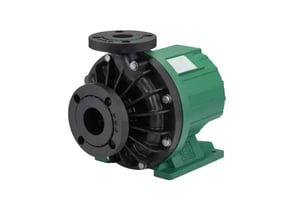
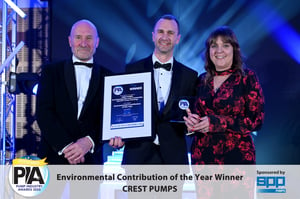
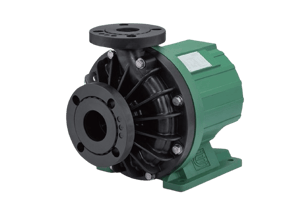
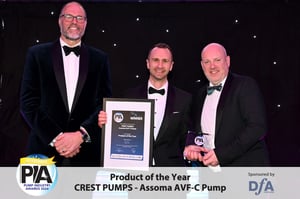
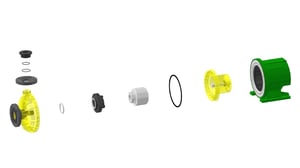
















Technical Specification
| AVF-C221 | AVF-C441 | AVF-C543 AVF-C553 |
AVF-C545 AVF-C555 |
AVF-C653 | AVF-C655 | |
| Capacity Range (L/min) | 10 - 180 | 20 - 350 | 40 - 450 | 60 - 650 | 60 - 550 | 80 - 850 |
|
Head Range (m) |
6 - 23 | 5 - 21 | 8 - 31 | 8 - 37 | 4 - 22 | 7 - 30 |
| Max Motor Output (kW) | 1.1 | 1.1 | 2.2 | 4 | 2.2 | 4 |
|
Rated Current 220V |
3.8 | 3.8 | 7.3 | 13 | 7.3 | 13 |
| Speed Range (rpm) | 2.2 | 2.2 | 4.2 | 7.5 | 4.2 | 7.5 |
| Speed Range (rpm) | 1500 - 3000 | |||||
| Protection Grade | IP66 | |||||
Frequently Asked Questions
Magnetic drive pumps are used in a wide variety of applications, including chemical processing, water treatment, and metal finishing. They are designed to provide a reliable and efficient solution for transferring corrosive and hazardous liquids. The pumps are constructed with a non-metallic construction, making them ideal for use in highly corrosive and hazardous environments.
Magnetic drive pumps are centrifugal pumps that use a magnetic coupling to transmit power from the motor to the impeller. The drive magnet is mounted on the motor shaft that will connect by magnetic force to driven magnets contained within the pump. This type of pump is ideal for applications where leakage or contamination of the pumped fluid is a concern, as there is no mechanical seal or shaft seal to fail.
Pumps are an essential part of many industries, and it is important that they operate as efficiently as possible. The Minimum Efficiency Index (MEI) is a metric used to measure the efficiency of a pump. MEI is particularly important for pumps exceeding 0.7 because it can help users save money on energy costs and reduce their carbon footprint.
What is the Minimum Efficiency Index (MEI) for Pumps?
The Minimum Efficiency Index (MEI) is a measurement of the efficiency of a pump. MEI is calculated by dividing the actual pump efficiency by the minimum efficiency for that type of pump. The minimum efficiency for each type of pump is set by the standards organizations such as the Hydraulic Institute and the European Union. The higher the MEI, the more efficient the pump is.
Why is MEI important for pumps exceeding 0.7?
MEI is particularly important for pumps exceeding 0.7 because it can help users save money on energy costs and reduce their carbon footprint. Pumps that exceed 0.7 are typically larger and more powerful, and they use more energy than smaller pumps. Therefore, even a small increase in efficiency can result in significant energy savings. In addition, using a more efficient pump can help reduce greenhouse gas emissions, which is an important consideration for many industries.
What are the benefits of using a pump with a high MEI?
- Lower energy costs: Since a more efficient pump uses less energy, it can help users save money on energy costs.
- Reduced carbon footprint: Using a more efficient pump can help reduce greenhouse gas emissions, which is an important consideration for many industries.
- Improved reliability: A more efficient pump is likely to last longer and require less maintenance than a less efficient pump.
- Better performance: A more efficient pump is likely to perform better, which can help improve overall process efficiency.
How can Crest Pumps help with MEI for pumps?
At Crest Pumps, we specialize in the design and manufacture of high-efficiency chemical resistant pumps. We understand the importance of MEI for pumps exceeding 0.7, and we can help our customers select the most efficient pump for their application. We offer a range of pumps with high MEI values, and we can provide expert advice and support to help our customers reduce their energy costs and carbon footprint.
|
Benefits |
How Crest Pumps Can Help |
|
Lower energy costs |
We offer a range of pumps with high MEI values, which can help our customers save money on energy costs. |
|
Reduced carbon footprint |
We understand the importance of reducing greenhouse gas emissions, and we can help our customers select pumps with the highest MEI values to achieve this goal. |
|
Improved reliability |
Our pumps are designed for reliability and long life, which can help our customers reduce maintenance costs and downtime. |
|
Better performance |
We offer pumps with high MEI values, which can help our customers improve overall process efficiency and performance. |
Conclusion
The Minimum Efficiency Index (MEI) is an important metric for pumps exceeding 0.7. Using a pump with a high MEI can help users save money on energy costs, reduce their carbon footprint, and improve overall performance and reliability
We have specialised in corrosion resistant pumps since 1973 so can almost certainly find you a solution to your application. Our chemical resistance table shows just some of the liquids we have experience pumping, but please talk to us to find the best chemical pumping solution for you.
- Check the pump regularly for signs of wear and tear.
- Ensure the pump is properly lubricated.
- Check the bearings for any signs of wear or damage.
- Ensure that the pump is properly aligned with the drive motor.
- Check the temperature of the pump and ensure it does not exceed the recommended levels.
- Ensure that the pump is running at the correct speed.
Trusted By The Best





































